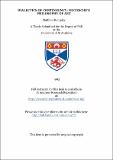Dialectics of contingency : Nietzsche's philosophy of art
View/
Date
07/1993Author
Supervisor
Funder
Metadata
Show full item recordAltmetrics Handle Statistics
Abstract
This thesis examines the function of art in Nietzsche's philosophy. Its primary concern is with Nietzsche's turn to art as the means to counter what he terms metaphysics. Metaphysics is a metonym for the system of beliefs sustaining our culture whereby human judgements about the world are perceived as uncovering an objective truth antecedent to those judgements, with an implicit faith in the possibility of exhausting the totality of these antecedent truths. This thesis consequently has two principal strands. The first is to analyse Nietzsche's criticism of metaphysics. The second is to explore the way in which, using a specific understanding of art, Nietzsche attempts to reconcile extreme scepticism towards all forms of human knowledge with a continued belief in their necessity. The thesis argues that Nietzsche lays an importance on art as providing an aesthetic education to replace the misguided theoretical orientation of metaphysics. Nietzsche criticises metaphysics for its inability to recognise that its interpretations are mere interpretations, that logic and the rational serve as means to make the world meaningful from the human perspective. My thesis explores how he sees art, and in particular the tragic, as constituting a mode of world interpretation which declares its status as such. I argue that for Nietzsche this is crucial inasmuch as a failure to recognise the contingency of our interpretations results in a refusal to give value in any interpretations. For Nietzsche the advent of the Modern age heralds the danger of such refusal, and hence I argue that his turn to art is a response to the specifically Modern temptation to descend into mere cynical Nihilism.
Type
Thesis, PhD Doctor of Philosophy
Collections
Items in the St Andrews Research Repository are protected by copyright, with all rights reserved, unless otherwise indicated.

